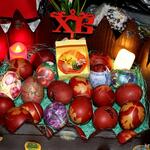Christ is Risen! “Truly Risen!”
Чyrsti ryegas! “Baelvyrd Raigas!”
It is in these words that the basic meaning of the Easter holiday is laid - the Resurrection of Christ. In Easter - the whole essence of Christianity, the whole meaning of faith. In the temples of South Ossetia on Easter night from Saturday to Sunday, Easter services were filled with spiritual joy and glee. The service is dedicated to the reconciliation of God and man, the victory of life over death.
The threat of the spread of coronavirus around the world this year has made adjustments to the festivities of churches. The Alanian diocese also limited festive events, recommended the believers not to visit crowded places, adhere to quarantine measures to prevent the spread of coronavirus adopted by the authorities of the Republic and pray at home. However, some parishioners came on Saturday evening to the Nativity of the Most Holy Theotokos and Holy Trinity Nativity churches and took part in a nightly celebration service, in cross procession, and also blessed Easter cakes, eggs and other Easter food.
This time, unlike most of past years, President of the Republic Anatoly Bibilov was not at the holiday service. The head of state met Great Easter at home. He turned to the Orthodox of the Republic, if possible, to refrain from visiting churches and to observe other precautions during the quarantine period as part of the fight against the spread of coronavirus infection COVID-19.
Anatoly Bibilov congratulated all Orthodox Christians on the occasion of the Resurrection of Christ and expressed hope that the world would come out of a difficult situation and that Orthodox Christians will soon be able to gather for service without any fear.
The priest of the Alanian Diocese, father Jacob, has noted that Holy Easter is celebrated as a symbol of the beginning of a new life. “Easter is the victory of God's love over the world, sin and unbelief. This is a celebration of joy, a celebration of life, we will pray for the health and well-being of the people of our Republic, and thank our Lord for peace and tranquility,” he said.
Father Jacob considers the feast of the Resurrection of Christ or Easter the culmination of the meaning of all Christianity. “It means the Lord’s coming to earth to take upon himself the sins of people and to resurrect. Christ, being unfairly condemned, crucified and killed by people, appeared to his disciples. The Holy Sunday of Christ is the confirmed hope of people for resurrection after death. The Lord took all the sins upon himself, he broke the gates of hell, gave eternal life and absolutely everyone can take advantage of this, he is waiting for everyone in the kingdom of heaven,” the priest says.
According to him, understanding this deep meaning, a person is filled with Easter joy, which consists in not fearing death as eternal darkness.
“There is death, it will be, but an Orthodox person hopes for the mercy of God and for going to heaven. This is the essence of the Easter holiday and Easter joy, and in the center of all this is the risen Christ. The Orthodox Christian must understand that Easter joy is not a partaking after almost fifty days of fasting,” said Father Jacob.
The priest has added that the week before Easter was full of daily services. On Thursday, the twelve gospels were read, which tell about the events that took place during the last passions of Christ. “After comes Great Saturday, when the whole world is quiet from ignorance of what happened. Shocked by the death of Christ, the disciples are very discouraged, the holy myrrh-bearing women saw the rejected stone from the coffin, and they had hope and remembered the words of Christ that would he be resurrected on the third day,” said Father James.
Holy Easter week lasts until Anti-Easter, according to the Ossetian Bældæræntæ - restoration of truth. And as the priest says, in these holy days people should limit themselves from hard work, moreover, they don’t even play weddings.
Anti-Easter Day is dedicated to the remembrance of the appearance of Jesus Christ to the Apostle Thomas on the eighth day after the resurrection. The Apostle Thomas doubted that Jesus Christ was resurrected because he did not see him. Only after meeting the Lord, seeing him and touching his wounds, did he believe in the miracle of resurrection. The whole meaning of this day is in the words of the Lord to the Apostle Thomas: “You believed because you saw Me; Blessed are they who have not seen and believed.”
“And after Anti-Easter, on Monday evening, matins is served on Radonitsa (Maertty Kuazan), a liturgy is held on Tuesday morning, and we consecrate Easter cakes and eggs again. On Radonitsa we share the Easter joy with our dead, on this day the gates of hell are open and all the dead can see Christ. And after the liturgy, people can go to the cemetery,” said the priest of the Alanian diocese.






